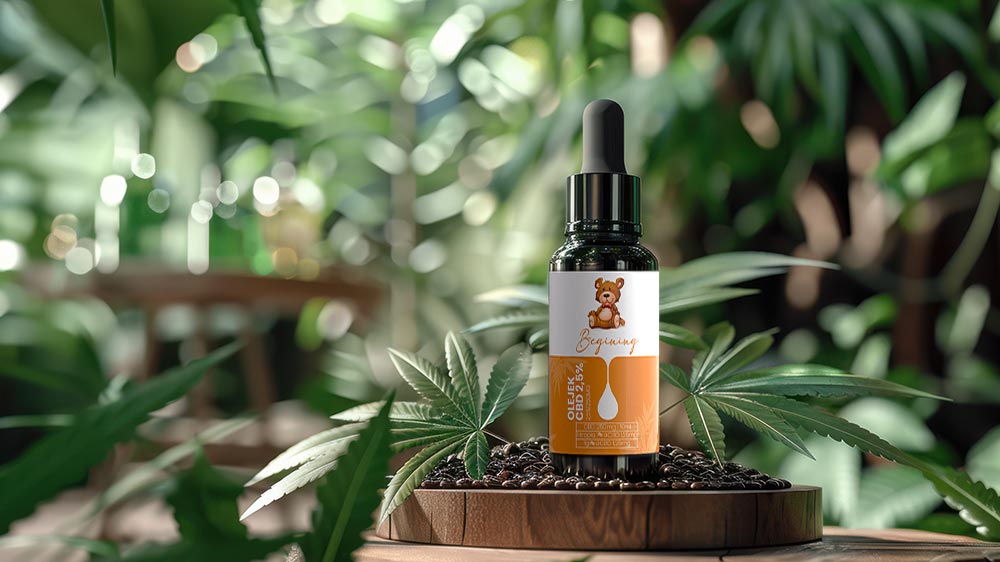Essential Bloom
69.00 zł
Essential Calm
69.00 zł
Essential Citrus
69.00 zł
Essential Forest
69.00 zł


Hemp products continue to gain popularity due to their various health and cosmetic properties. Among them, the most popular are: hemp oil and CBD oil. Although both products come from hemp, they are often confused with each other due to their similar name and plant origin. However, their composition, method of action, and application differ significantly. In this post, we will explain what exactly hemp oil and CBD oil are and in what situations it is worth reaching for each of them.
Hemp oil is obtained by cold pressing the seeds of hemp (Cannabis sativa). Unlike CBD oil, it does not contain valuable cannabinoids, primarily CBD. However, it has a wealth of nutrients that are also beneficial to our body.
Hemp oil contains a high amount of essential unsaturated fatty acids (EFAs), including valuable omega-3 and omega-6 acids in an ideal 3:1 ratio.
It contains a lot (as much as 60%) of linoleic acid (18:2 n-6) and then (approx. 19%) of α-linolenic acid (18:3 n-3)[1]. Hemp oil also contains γ-linolenic acid (18:3 n-6, GLA) and stearic acid (18:4 n-3, SDA), which are relatively rare in other popular vegetable oils such as rapeseed oil.
Hemp seed oil is also an excellent source of vitamins (A, D, E, K), minerals and antioxidants that support overall body health.
It is also rich in antioxidants, such as tocopherols, carotenoids, sterols and polyphenols.[2].
Hemp oil is a valuable nutrient, and because it has a delicate, nutty flavor, it works great as an addition to salads, smoothies, sauces and dips. However, it should not be used for frying, because it loses its nutritional properties at high temperatures.
Due to its moisturizing properties, hemp oil is a common ingredient in skin creams, body lotions and shampoos. It helps to regenerate dry, irritated skin, improving its elasticity and hydration. You will find hemp oil in many of our cosmetics, especially in our series of body oils Body Oil
Hemp oil does not contain CBD and does not directly affect endocannabinoid system, meaning it doesn’t produce the therapeutic effects attributed to cannabinoids. However, it is an excellent source of nutrients that support heart health, skin health, and overall well-being.
CBD oil is obtained primarily from hemp flowers. It contains a valuable, bioactive compound – cannabidiol (CBD), which affects the endocannabinoid system in the human body, regulating mood, sleep, appetite and pain responses, among other things. It also has documented anti-inflammatory, antioxidant and immune-stimulating effects. Along with other cannabinoids found in hemp, it is considered one of the most valuable substances obtained from hemp[3].
CBD oil, especially in the form of CBD full spectrum, contains not only valuable CBD, which is the main active substance, but also many other phytoactive substances derived from hemp:
Scientists studying the effects of CBD on the human body have noted that the numerous active compounds in hemp enhance its effects. Because all of these compounds interact with each other in a beneficial way and affect our body via the ECS, or endocannabinoid system, we are talking about the so-called entourage effect (read: entourage) or the effect of the entourage. This is the full effect of the beneficial properties of the plant[4].
You can read about this effect in our post: Full spectrum CBD extract – what’s behind it?
Dietary supplement: CBD oil is mainly used for health purposes to support mental balance, help fight stress, improve sleep quality and relieve anxiety.
Pain Relief: CBD has anti-inflammatory and analgesic effects, making it popular among people with chronic pain, arthritis, or migraines.
Therapy support: CBD oil is increasingly being used to support therapy in people suffering from neurological conditions, anxiety disorders or PTSD.
CBD works on the endocannabinoid system, which affects the regulation of many functions in the body, such as appetite, sleep, and pain. It is not psychoactive, which means it does not cause a state of intoxication. It works synergistically on many systems and organs in our body, causing the effect of homeostasis and restoring balance to the whole body.
Despite the similarity in name, hemp oil and CBD oil differ in several key aspects:
The choice between hemp oil and CBD oil depends on what effect we expect:
[1] https://ncez.pzh.gov.pl/abc-zywienia/olej-konopny-czy-warto-stosowac/
[2] http://www.postepyfitoterapii.pl/wp-content/uploads/2017/09/pf_2017_139-144.pdf
[3] https://www.medicalnewstoday.com/articles/cbda?utm_source=ReadNext#definition
[4] https://www.openaccessgovernment.org/entourage-effect-cannabis-relieve-pain-cannaboids-terpenes/154305/